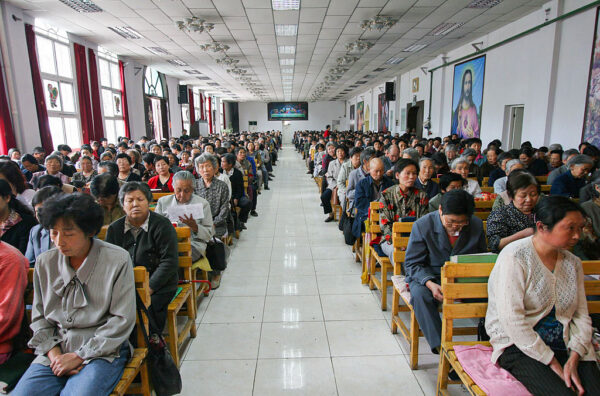Chinese Universities Use Big Data to Monitor Students: Leaked Recording
A Chinese university has been training educators to monitor students with an on-campus information management system, according to a recording obtained by the Chinese language edition of The Epoch Times.According to the recording from a 2019 training session on the information management system, the School of Marxism at Wuhan University is responsible for training political instructors from all Chinese tertiary educational institutions on how to use the system. Political instructors are unique to Chinese universities. They are responsible for students’ political indoctrination and surveillance of their thinking, especially their political and religious ideologies. The publication obtained the recording in July from a reliable source who requested to remain anonymous for fear of retaliation from the authorities. According to the trainer in the recording, the information management system comprises an online database, an offline database, and real-time monitoring devices. The surveillance begins when students scan the barcode on their enrollment notices. When students arrive at the campus, they fill out various forms, which add to their database. The personal information is recorded in the information management system, including academic and disciplinary records, library books, cafeteria food, conversations with teachers, and absence from classes. The trainer said that with the data collected, the administration can “fully understand every single student and to control students, especially to prevent their ‘abnormal behavior.’” A real-time monitoring system sends messages to relevant political instructors at 10:30 p.m. and 7:30 a.m. every day, informing them of the students who haven’t returned to their dormitories and suggesting disciplinary actions. The trainer admitted that there were still “bugs” in the information system. He cited a student’s case as an example. According to the information system, the student had been wandering on campus the whole night, using routers of two different locations. However, the political instructor later found out that the student had stayed in his dorm, watching the World Cup. He had kept changing the routers, as his dorm was located in the middle of the two routers. He chose a router with better signals so he could enjoy watching the game. The trainer said the student was upset when he found out the university was monitoring him and wanted to sue the school for violating his privacy. But the political instructor told the student not to take it personally because the university is monitoring the behavior of all students and keeping a close watch on “abnormal behavior” due to “security reasons.” The trainer said the system needed improvement in detecting devices and legal support. He didn’t mention what other detecting devices were used besides the routers. Religious Beliefs Monitored The information system also records students’ religious beliefs, according to the trainer. “Now that students have to provide information on their religious beliefs in the system, the political instructor can then talk with them about their faith, such as when and why they started practicing,” the trainer said in the recording. Christians pray during a mass at a church in Xining, Qinghai Province, northwest China, on July 3, 2005. China officially sanctions five religious groups: Protestant and Catholic Christianity, Islam, Buddhism, and Taoism. The Chinese are allowed to worship only in state-sanctioned churches and temples. (China Photos/Getty Images) The Chinese regime advocates atheism and suppresses orthodox religious beliefs. It “continued to vigorously implement its ‘sinicization of religion’ policy and demand that religious groups and adherents support the Chinese Communist Party’s (CCP) rule and ideology,” according to the U.S. Commission on International Religious Freedom (USCIRF) in its 2022 annual report. The CCP imposed “further restrictions on clergy, religious schools, and religious content on the internet,” the report said. The System Is for Surveillance: Chinese Dissidents Overseas Chinese dissidents believe that the CCP has been tightening its control of university students through the information management system. A former teacher surnamed Pei (pseudonym) told The Epoch Times in a recent interview that other schools, such as Shanghai Jiao Tong University and Southeast University, offer training on the surveillance system. “The CCP has never relaxed its control of university students in China,” said Pei, who used to teach at a university in northern China. Chinese university students have played a major role in China’s democratic movements, such as the protests in Tiananmen Square in Beijing in 1989. Students from major universities gathered at the iconic square in the capital city, demanding democracy and government reform. The CCP’s armed military troops violently suppressed the peaceful protest. A secret British cable alleged that at least 10,000 p

A Chinese university has been training educators to monitor students with an on-campus information management system, according to a recording obtained by the Chinese language edition of The Epoch Times.
According to the recording from a 2019 training session on the information management system, the School of Marxism at Wuhan University is responsible for training political instructors from all Chinese tertiary educational institutions on how to use the system.
Political instructors are unique to Chinese universities. They are responsible for students’ political indoctrination and surveillance of their thinking, especially their political and religious ideologies.
The publication obtained the recording in July from a reliable source who requested to remain anonymous for fear of retaliation from the authorities.
According to the trainer in the recording, the information management system comprises an online database, an offline database, and real-time monitoring devices.
The surveillance begins when students scan the barcode on their enrollment notices. When students arrive at the campus, they fill out various forms, which add to their database.
The personal information is recorded in the information management system, including academic and disciplinary records, library books, cafeteria food, conversations with teachers, and absence from classes.
The trainer said that with the data collected, the administration can “fully understand every single student and to control students, especially to prevent their ‘abnormal behavior.’”
A real-time monitoring system sends messages to relevant political instructors at 10:30 p.m. and 7:30 a.m. every day, informing them of the students who haven’t returned to their dormitories and suggesting disciplinary actions.
The trainer admitted that there were still “bugs” in the information system. He cited a student’s case as an example.
According to the information system, the student had been wandering on campus the whole night, using routers of two different locations. However, the political instructor later found out that the student had stayed in his dorm, watching the World Cup. He had kept changing the routers, as his dorm was located in the middle of the two routers. He chose a router with better signals so he could enjoy watching the game.
The trainer said the student was upset when he found out the university was monitoring him and wanted to sue the school for violating his privacy. But the political instructor told the student not to take it personally because the university is monitoring the behavior of all students and keeping a close watch on “abnormal behavior” due to “security reasons.”
The trainer said the system needed improvement in detecting devices and legal support. He didn’t mention what other detecting devices were used besides the routers.
Religious Beliefs Monitored
The information system also records students’ religious beliefs, according to the trainer.
“Now that students have to provide information on their religious beliefs in the system, the political instructor can then talk with them about their faith, such as when and why they started practicing,” the trainer said in the recording.

The Chinese regime advocates atheism and suppresses orthodox religious beliefs. It “continued to vigorously implement its ‘sinicization of religion’ policy and demand that religious groups and adherents support the Chinese Communist Party’s (CCP) rule and ideology,” according to the U.S. Commission on International Religious Freedom (USCIRF) in its 2022 annual report. The CCP imposed “further restrictions on clergy, religious schools, and religious content on the internet,” the report said.
The System Is for Surveillance: Chinese Dissidents
Overseas Chinese dissidents believe that the CCP has been tightening its control of university students through the information management system.
A former teacher surnamed Pei (pseudonym) told The Epoch Times in a recent interview that other schools, such as Shanghai Jiao Tong University and Southeast University, offer training on the surveillance system.
“The CCP has never relaxed its control of university students in China,” said Pei, who used to teach at a university in northern China.
Chinese university students have played a major role in China’s democratic movements, such as the protests in Tiananmen Square in Beijing in 1989. Students from major universities gathered at the iconic square in the capital city, demanding democracy and government reform. The CCP’s armed military troops violently suppressed the peaceful protest. A secret British cable alleged that at least 10,000 people died from the massacre.
Pei said that the collection of students’ data is for surveillance. “Students, including those of Wuhan University, have no idea that they are under such close surveillance.”
The data can help the school administrators to analyze and predict students’ behaviors, so they can take precautions, she added.
Pei advises Chinese students and teachers not to use their university’s public Wi-Fi if they want to surf international websites, not even with VPNs (virtual private networks).
A VPN hides the user’s public IP address when connecting to web-based services and sites. Many Chinese netizens use VPNs to circumvent China’s firewall to access the outside digital world.
However, the Chinese big data can show who is using VPNs, including their account details, said Pei.
Qin Jie, a computer science graduate from Wuhan University, told the publication that the administration can monitor students and teachers via the on-campus information network. He said that the content of all chat software could be monitored through the school server.
“The Wuhan University authorities are afraid that the students could revolt, so they monitor us very closely,” Qin said.
In the past, he attempted to establish a pro-democracy group on a Chinese social media platform, but his account was banned. The university also punished him for criticizing the administrators. Qin now lives in exile in Germany.
In 2022, the China Association of Higher Education published a report on information technology development in Chinese universities and colleges. It claims that information technology has achieved significant progress in the past decade and that “digital campuses have been established to integrate physical space and cyberspace.”
The Epoch Times reached out to Wuhan University and its School of Marxism for comment and has received no response as of press time.
Li Xin’an contributed to this report.












